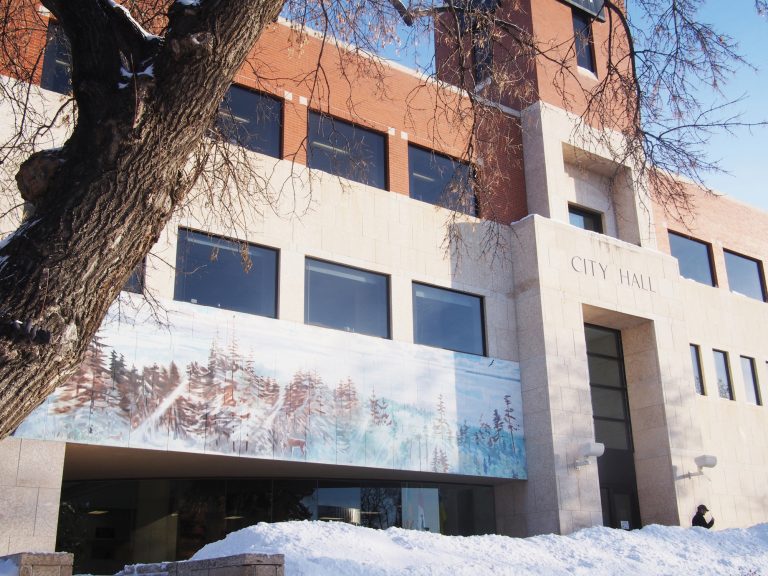
Prince Albert city council voted unanimously to waive utility bill late fees and allow property owners to apply for tax deferrals during a special council meeting on Wednesday.
The City will continue to send out utility bills, but will not disconnect services for unpaid invoices, while property owners will still have to pay their taxes by the regular deadline if the City refuses their application.
The changes are part of a COVID-19 relief package aimed at Prince Albert residents and businesses struggling due to pandemic restrictions. Mayor Greg Dionne said council may consider additional relief measures if the outbreak continues to last. However, their main focus in the next week will be on post-pandemic aid.
“What we should be doing as cities and governments now is planning how we can get out of this,” Dionne said following Monday’s meeting. “We have to figure out how we can get people back to work…. That’s what I’m worried about. Where do we go? What’s life like after the pandemic?”
Wednesday’s vote means property owners can apply to have their taxes deferred from June 30 to Sept. 30, provided they submit an application by the June 15 deadline. Residents are also free from paying late fees and compound fees on outstanding utility bills. The change will be retroactively applied to April 1, even though the provincial government declared a State of Emergency on March 18.
Cheryl Tkachuck, Prince Albert’s financial services director, said the City’s billing and water usage tracking cycles made it difficult to start from that date.
City councillors offered few objections to the proposals, with most saying it was obvious residents need some relief.
“It gives our residents—those who were affected by COVID—an opportunity to catch their breath a little bit, and let them know that their City’s here for them when they need it,” Ward 8 Coun. Ted Zurakowski said.
“We at city council have been looking at this from so many angles,” Ward 3 Coun. Evert Botha added. “None of us ever thought that we would be facing such a pandemic in our term, let alone in our lifetime. These are uncharted territories for any city council.”
There were some minor changes to the motions presented during Monday’s meeting. The original property tax deferral plan would have required businesses to prove they lost at least 40 per cent of their gross business revenue during COVID-19. Council decreased that to 30 per cent after a short discussion.
There was also some debate over how to pay for the two new relief measures. City administrators recommended taking out both a $10,000 line-of-credit and a $10,000 short-term loan. Interest rates would be at 1.7 per cent and three per cent respectively.
Dionne said he’s confident the city is strong enough to handle the additional debt. He added that any future provincial or federal funding would go towards paying it off as quickly as possible.
“I’m not expecting (provincial or federal funding), but you never know,” he said. “They’re helping out small businesses and big businesses. Maybe they’ll help out the municipalities. You never know, but if we ever do get funding to help us out with our debt load and stuff like that, … to me, that would go right to our loan.”
The City’s financial department expected to receive nearly $58 million in property taxes this year prior to the pandemic. Roughly $10.8 million has already been collected. Waiving late fees and compound fees on overdue utility bills will cost an estimated $30,000 per month.
City councils in Saskatoon and Regina have already passed bylaws deferring property tax payments, as have councils in Estevan and Swift Current. Saskatoon and Regina have also waived utility penalty charges for the next six months, and suspended service disconnections for accounts in arrears. Neither city approved deferring utility payments. The City of Moose Jaw has also stopped shutting off utilities for unpaid bills, but has not waived late fees.
Dionne already looking towards pandemic’s end
Mayor Greg Dionne says he has no idea when the COVID-19 outbreak will end, but municipal officials are already preparing for when it does.
Dionne promised to release more details about the proposed Prince Albert Recovery Project sometime next week. He said they’re anticipating at least 40 per cent of businesses won’t reopen after closing for the pandemic. While they’re hoping for the best, they’re also preparing for the worst.
“Lots of people now have lost trust,” he said. “For example, am I going to a Garth Brooks concert in August in Saskatoon with 30,000 people there? I don’t think so. Even though the pandemic could be over—and if it is over they’ll allow it—I’m going to be a little hesitant going to some of those, and that’s what they’re worried about.”
Dionne said he expects the restaurant business to be among the hardest hit industries in Prince Albert, if not the hardest. He said it will almost be like starting over for businesses owners, but remained optimistic they could pull through with a bit of help.
“We’re northerners,” he said. “We’re survivors, and I think we can come out of this.”
